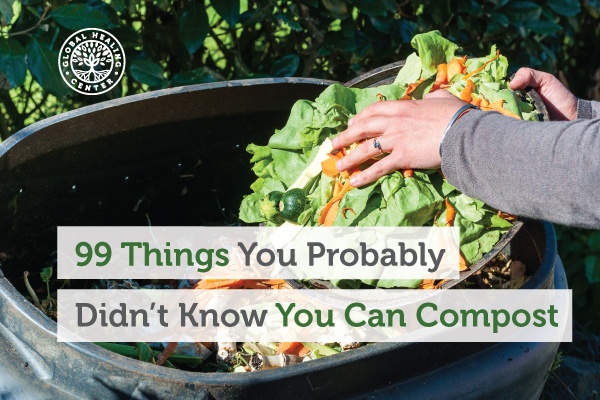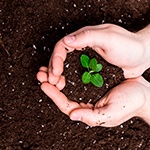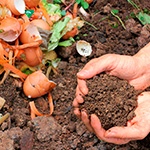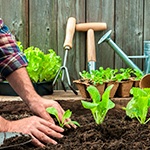
Anybody who has a composting bin or compost pile at their house knows that old apple cores, banana peels, and potato skins can be composted. The list of compostable items doesn’t stop there, in fact, it barely scratches the surface.
Did you know that you can compost an old teabag? Old spices? Grass clippings? How about sticky notes? Yes, each of those items can be composted!
There are many compostable items, and this list will get you started with the first ninety-nine. Composting at home is a very effective method to reduce the amount of waste you contribute to the landfill.
If you are composting for an organic garden, use organic starting materials. Some of the items below I would not recommend for organic gardens. For clarity, I will specify those items below.
The Basics
- All organic vegetable and fruit matter including rinds, skins, shells, seeds, cores, and peels
- Leaves
- Hay
- Used coffee grounds
- Paper coffee filters
- Grass clippings
- Egg shells
- Tea bags
- Peat moss
- Tree bark
- Flowers
- Garden soil
- Topsoil
- Stale bread
- Wheat bran
- Cooked grains
- Olive pits
- Popcorn kernels
- Dust bunnies
- Toothpicks
- Business cards (Paper)
- Natural wine corks
- Toilet paper rolls
- Wrapping paper rolls
- Loose-leaf tea leaves
- Dried brown garden weeds (avoid composting weeds that go to seed)
- Spices and herbs that have lost their smell
- Nut shells (except walnut shells, which contain a chemical that can be toxic to plants)
- Wood chips and sawdust — from untreated wood, treated wood is toxic
- Compostable cat litter
- Wine and beer-making wastes
- Dry cereals, crackers, chips, cookies, etc.
- 100% cotton swabs and Q-tips (do not compost plastic sticks)
- Wood fire ashes from grill or fireplace
- Dirt from soles of shoes
- Facial tissues (unless soiled with chemical products)
- Organic milk, ice cream, cream, etc. (in limited amounts)
- Spoiled rice, almond, or coconut milk
- 100% cotton clothing (ripped into small pieces)
- 100% wool clothing (ripped into small pieces)
- Raffia decorations
- Crepe paper streamers
- Paper napkins
- Natural wreaths, garlands, and other natural holiday decor
- Chopped up Christmas trees
- Aquarium plants
- Paper bags (ripped into smaller pieces)
- Sticky notes
- Any form of paper that has been soiled by food
- Pizza boxes (make sure to break them down into small pieces)
- Used paper plates without wax coatings
- Mail and bills (make sure not to compost envelopes with the plastic windows)
- Paper or wood matches
- Animal manure and droppings
- Paper towels and towel rolls
- Cork
- Organic glue
- Animal fur
- Gelatin
- Paper muffin and cupcake cups
- Cage cleanings from small pets such as Guinea pigs, rabbits, birds, and iguanas
- Freezer-burned fruits and veggies
- Burlap sack
- Stale candy (remove the wrapper, of course!)
- Cardboard and paper egg cartons
- Cardboard tampon applicators
- The boxes that surround many forms of cheeses
- Pure cellophane bags
- Paper envelopes from your mail (shredded up)
- Shredded catalogs and magazines (unless they have a very waxy cover)
- Chewing gum
- Feathers
- Rope
- Stale catnip
- Organic cotton socks
- Dead houseplants
- Halloween pumpkins
- Electric razor trimmings
- Fingernail and toenail clippings
- Hair (both human and animal hair is compostable)
- Ground bone and blood meal
- Rawhide dog chews
- Dog/cat foods
- Dryer lint
- Urine (although can be quite smelly in the summer sun)
- Cheeses
- Corn cobs
- Beer, wine, and liquor
- Crustacean shells (shrimp, crab, lobster, etc.)
- Organic tobacco waste
- Bamboo products
- Fish food
- Egg shells
- Shower loofahs (made from natural materials, such as sea sponge)
- Newspaper (shredded)
- Granite dust
- Dolomite lime
- Liquid from canned fruits and vegetables
- Pure soap scraps
†Results may vary. Information and statements made are for education purposes and are not intended to replace the advice of your doctor. If you have a severe medical condition or health concern, see your physician.







